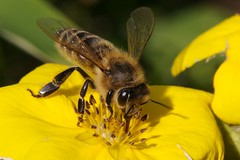This is a guest post by my friend, Marion Yoder, who keeps bees with her husband on their farm.
 Honey.... the word brings to mind wholesome sweetness, purity, integrity. How could you possibly go wrong? The question we really need to ask is, "Is honey all it's cracked up to bee?" The answer is...... well, complicated, yes and no, it depends, ya know? I will try to clarify with answers to a few key questions. Hold onto your seats :-)
Honey.... the word brings to mind wholesome sweetness, purity, integrity. How could you possibly go wrong? The question we really need to ask is, "Is honey all it's cracked up to bee?" The answer is...... well, complicated, yes and no, it depends, ya know? I will try to clarify with answers to a few key questions. Hold onto your seats :-)What is honey anyway?
No, it's not bee spit, like that kid in first grade insisted it is ;-) Honey is the secretions of flowers, collected and condensed by honeybees, to an average of 17% moisture. They must forage far and wide to get it, traveling up to 5 miles from their hive and tapping around a million flowers to make just one pound. One honeybee, in it's entire 6 week lifespan, will produce 1/12 of a teaspoon of honey. Honey varies in color, flavor and composition depending on the flowers it was made from, but contains a blend of plant sugars, along with enzymes, minerals, and trace amounts of pollen and propolis (plant resins collected by the bees).
Does honey need to be refrigerated?
No, it doesn't. Honey has a high enough percentage of sugar that it should never go bad. Actually, honey found in the pyramids has been dated at 3-4,000 years old, and is still good! Honey does darken with age, and may crystalize. It crystalizes most quickly at or around 46 degrees, which is why I recommend storing it in a warm cupboard rather than the fridge. :-)
 Is raw honey better?
Is raw honey better?Absolutely! Right off the bat, raw honey tastes better, but that's just the tip of the iceberg. When honey is pasteurized, as most is, it is heated to 160* or higher. The point of this is twofold. When heated, honey gets a lot thinner, allowing it to be pumped through a super fine filter. This removes all of the pollen and propolis, as well as any fine crystals, making it more likely that it won't crystalize. Heating incidentally kills all of the enzymes as well, and changes the chemical structure of some of the sugars. The other reason for heating the honey, is to "sterilize" it, because we just shouldn't eat stuff that isn't you know, it might be (horrors!) good for us! Raw honey still contains all of the good stuff, and while it may crystalize more quickly, quite often it doesn't. Even if it does it is still fine to eat, it just has a different texture :-) I like it better for baking as it's easier to measure. The tiny bits of pollen in raw honey are what make it so good for allergies. Honey from your state likely contains pollen from plants you are allergic to, so if you take a teaspoon a day, your body gets used to those, and doesn't react as violently when it comes in contact with them. While it doesn't always work, many folks with allergies have been helped by this simple remedy.
I've heard there can be chemical residues in honey, is this true?
Yes, it is. The honey you find in the grocery stores, is usually from big companies that buy it wherever they can get it the cheapest (usually China, surprised?) and then bottle it under their name. The cheapest honey is generally from big beekeepers. These guys run 20-30,000 hives, and truck them all over, charging for pollination, which is their main income. To them, the honey is often just a "by-product". Riding a semi-truck is stressful to bees, and so there are a multitude of pests, pesticides, and other bumps in the road. The industrial beekeeper handles these stresses just like the industrial farmer. Throw chemicals and antibiotics at them! Bees store their honey in wax comb, and that wax soaks up chemicals like a sponge, releasing them into the honey in small doses. Often beeswax lasts 10-15 years, accumulating a huge load of heavy residues, things like organophosphates, oxytetracycaline, and fluvalinate. Beekeeping doesn't have to include this kind of junk, but when it doesn't, just like organic farming, it's more work.
The bottom line:
Know your beekeeper! Buy your raw honey from small beekeepers in your state that avoid the use of chemicals. Do this, and your honey will indeed live up to it's reputation :-)
Marion Yoder is a second-generation home-schooling mother of 4 (going on 5) little people. She and her husband, Joseph, live and work on his family's 190 acre farm in Holmes county Ohio. Marion started early with her love of all things natural, especially food, and has been learning more ever since. The Yoders raise bees, cattle, sheep, chickens, and heirloom veggies on their sustainable farm. Their goal is to provide local families with affordable foods raised the way God designed them to be. They sell their wares at area farmers markets, as well as at the small store located on the farm.

No comments:
Post a Comment